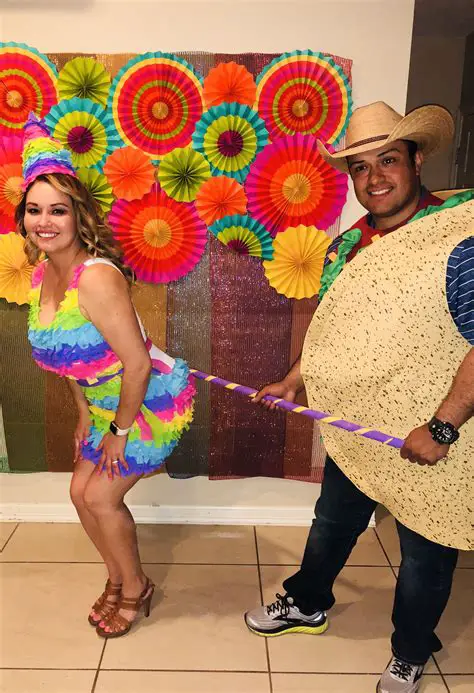Mexico’s rich cultural heritage and vibrant traditions offer a treasure trove of inspiration for captivating couple costumes. Immerse yourselves in the festive spirit and explore the diverse regions, ethnicities, and folklore that make Mexican culture so captivating.

Explore the Enchanting Costumes of Mexico
Traditional Mexican Outfits
Embark on a journey through Mexico’s vibrant history and embrace the classic attire that has become synonymous with the country.
- Charro and China Poblana: Step into the roles of the iconic Mexican horseman and his graceful counterpart. The charro’s intricate embroidery and silver buttons complement the China Poblana’s colorful skirt and embroidered blouse.
- Huipil and Calzones: Dive into the indigenous world of Oaxaca and don the vibrant huipil, a traditional hand-woven blouse adorned with intricate patterns, paired with colorful calzones (pants).
- Sarape and Rebozo: Wrap yourselves in the warmth of a serape, a hand-woven textile featuring striking geometric designs, and complement it with a rebozo, a long and fringed shawl.
Festive Holiday Costumes
Celebrate the joyous festivals of Mexico with costumes that honor its rich heritage.
- Día de los Muertos (Day of the Dead): Embrace the vibrant colors and symbolism of this captivating holiday with costumes adorned with skulls, flowers, and elaborate face paint.
- Las Posadas: Revel in the Christmas spirit as you portray the Holy Family, with costumes representing Mary, Joseph, and the wisemen.
- Carnaval: Let loose and celebrate the carnival festivities with colorful costumes, masks, and feathered headdresses.
Regional Costumes
Mexico’s diverse regions offer a kaleidoscope of cultural experiences, reflected in their unique costumes.
- Nayarit: Adorn yourselves in the intricate and colorful beadwork of the Huichol people, with costumes featuring geometric patterns and vibrant colors.
- Chiapas: Immerse yourselves in the traditional costumes of the Maya indigenous community, characterized by embroidered blouses, skirts, and intricate headdresses.
- Jalisco: Embrace the charro and mariachi culture with costumes showcasing elaborate embroidery, silver buttons, and wide-brimmed hats.
Step-by-Step Guide to Creating Your Costume
- Research and Inspiration: Explore the different regions and traditions of Mexico to gather inspiration for your costumes. Research traditional attire, festival costumes, and regional variations.
- Material Selection: Choose fabrics and materials that reflect the authenticity and quality of the costume. Consider the traditional textiles, embroidery, and embellishments used in Mexican culture.
- Construction and Detailing: Pay meticulous attention to the details and craftsmanship of your costume. Hand-stitch embroidery, create intricate beadwork, and use authentic materials to capture the essence of Mexican artistry.
- Accessories and Embellishments: Elevate your costumes with traditional accessories such as sombreros, rebozos, serapes, and jewelry. Consider incorporating elements of the region or festival you are representing.
- Makeup and Hair: Enhance the realism of your costumes with traditional makeup and hairstyles. Use vibrant colors, intricate designs, and flower crowns to complete your transformation.
Table 1: Traditional Mexican Couple Costumes
| Costume | Description |
|---|---|
| Charro and China Poblana | Iconic Mexican horseman and his graceful counterpart |
| Huipil and Calzones | Vibrant hand-woven blouse and colorful pants |
| Sarape and Rebozo | Warm and colorful hand-woven textile and fringed shawl |
| Día de los Muertos | Costumes adorned with skulls, flowers, and face paint |
| Las Posadas | Costumes representing Mary, Joseph, and the wisemen |
| Carnaval | Colorful costumes, masks, and feathered headdresses |
Table 2: Regional Mexican Couple Costumes
| Region | Description |
|---|---|
| Nayarit | Intricate and colorful beadwork of the Huichol people |
| Chiapas | Embroidered blouses, skirts, and intricate headdresses of the Maya indigenous community |
| Jalisco | Elaborate embroidery, silver buttons, and wide-brimmed hats of the charro and mariachi culture |
Table 3: Materials for Mexican Costumes
| Material | Use |
|---|---|
| Cotton | Clothing, shirts, skirts, blouses |
| Wool | Serape, rebozos |
| Silk | Embroidered blouses, shawls |
| Leather | Boots, sombreros |
| Beads | Jewelry, embroidery |
Table 4: Costume Accessories and Embellishments
| Accessory | Description |
|---|---|
| Sombreros | Traditional Mexican hats |
| Rebozos | Long, fringed shawls |
| Serapes | Hand-woven textiles |
| Jewelry | Silver and turquoise necklaces, earrings, bracelets |
| Makeup | Vibrant colors, intricate designs, flower crowns |
Elevate Your Costume with Authenticity
To truly capture the essence of Mexican culture, consider incorporating authentic elements into your costumes.
- Visit Local Artisans: Support local artisans by purchasing handmade textiles, jewelry, and accessories directly from indigenous communities and skilled craftspeople.
- Attend Cultural Events: Immerse yourselves in Mexican culture by attending festivals, markets, and other cultural events to gain firsthand inspiration.
- Respect Traditions: Be mindful of cultural sensitivities and respect the traditions associated with the costumes you choose to wear. Avoid appropriating sacred or ceremonial attire.
Engage Your Audience and Create Impact
When showcasing your Mexican couple costumes, engage your audience and create a memorable experience.
- Share Your Story: Explain the inspiration behind your costumes, the cultural significance of the designs, and how you crafted them.
- Educate and Inform: Use your costumes as an opportunity to educate others about Mexican culture and traditions. Share facts and insights to foster understanding and appreciation.
- Celebrate Diversity: Embrace the diverse cultural expressions within Mexico and showcase costumes that represent different regions and ethnicities.
Conclusion
Step into the enchanting world of Mexican couple costumes and immerse yourselves in the vibrant culture and traditions of this captivating country. From classic attire to festive regalia and regional variations, there are countless options to bring your imaginations to life. By embracing authenticity and engaging your audience, you can create a lasting impression that celebrates the rich tapestry of Mexican heritage.
